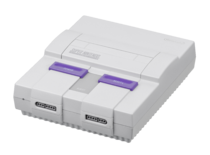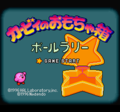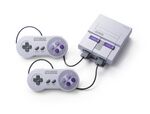Super Nintendo Entertainment System: Difference between revisions
Tag: Reverted |
m (Undo revision 416450 by 2001:861:5BC2:B850:B474:13A5:1D10:74D6 (talk) False, it's Linux: https://tcrf.net/SNES_Classic_Edition/Production_Test_Menu/Log_Outputs) Tag: Undo |
||
| Line 32: | Line 32: | ||
== Classic Edition == | == Classic Edition == | ||
[[File:SNES_Classic.jpg|150px|thumb|left|The SNES Classic Edition.]] | [[File:SNES_Classic.jpg|150px|thumb|left|The SNES Classic Edition.]] | ||
The '''Super Nintendo Entertainment System Classic Edition''', referred to as the '''Nintendo Classic Mini: Super Nintendo Entertainment System''' in European languages, sometimes shortened to '''SNES Classic Edition''' or '''SNES Classic''', is a standalone emulator built to resemble a Super Nintendo Entertainment System, released by Nintendo in 2017. It runs on the | The '''Super Nintendo Entertainment System Classic Edition''', referred to as the '''Nintendo Classic Mini: Super Nintendo Entertainment System''' in European languages, sometimes shortened to '''SNES Classic Edition''' or '''SNES Classic''', is a standalone emulator built to resemble a Super Nintendo Entertainment System, released by Nintendo in 2017. It runs on the Linux operating system and emulates SNES games by using a set of dedicated emulation software developed by Nintendo European Research and Development. It comes with 21 pre-installed Super Nintendo games, two of them being ''Kirby's Dream Course'' and ''Kirby Super Star''. | ||
{{clear}} | {{clear}} | ||
Revision as of 15:06, 26 March 2023
| ||||||||||
| ||||||||||
| ||||||||||
|
| ||||||||||
The Super Nintendo Entertainment System, commonly abbreviated as SNES, Super NES or Super Nintendo, is a video game console developed and published by Nintendo. It is the successor of the Nintendo Entertainment System and, unlike its predecessor, possesses 16 bit instead of only 8. It was released on November 21, 1990 in Japan and made its way to North America on August 13, 1991, bearing a different design than the Super Famicom. A model nearly identical to the Japanese console was released in Europe on April 11, 1992 and in Australia on July 3, 1992.
Outside of Japan, the system was discontinued in 1999. The Japanese Super Famicom, however, was not discontinued until 2003. It was succeeded by the more powerful Nintendo 64. During its life time, six Kirby games have been released on the console, of which two are exclusive to Japan while another was never released there.
Super Game Boy
The Super Game Boy (スーパーゲームボーイ, Sūpā Gēmu Bōi) is an adapter cartridge released for all Super Nintendo Entertainment System models in 1994. It has a slot at the top that allows the user to insert any standard Game Boy cartridge. Then, the adapter can be played like a regular SNES cartridge, which allows the user to play the inserted Game Boy game on the SNES. As the Game Boy makes use of a smaller screen, the rest of the display is filled with a border that can be selected from the Super Game Boy's menu. Furthermore, games can be displayed in color, using one of several pre-set palettes or a custom one. However, because it uses the hardware of a standard Game Boy, the adapter cannot use palettes designed for the Game Boy Color, or run Game Boy Color-exclusive games at all.
Certain Game Boy games take advantage of the Super Game Boy's capabilities to present the game in more colors than would usually be possible, provide different pre-set palettes for different parts of the game, incorporate additional, higher-quality sound effects via the SNES's S-SMP audio chip, and display custom borders around the playing field. Out of the Kirby series, Kirby's Dream Land 2, Kirby's Block Ball, and Kirby's Star Stacker all take advantage of these features, with special borders and defined palettes, as well as using the Super Game Boy's internal sound effects for Dream Land 2 and Star Stacker. The other two Game Boy Kirby games—Kirby's Dream Land and Kirby's Pinball Land—both have a special Super Game Boy palette, but no additional features. Kirby Tilt 'n' Tumble, due to being Game Boy Color-exclusive, is not compatible with the Super Game Boy.
Kirby games on the Super Nintendo Entertainment System
Kirby's Avalanche (not released in Japan)
Kirby's Toy Box (Satellaview; Japan only)
Kirby's Star Stacker (Japan only)
Canceled
Classic Edition
The Super Nintendo Entertainment System Classic Edition, referred to as the Nintendo Classic Mini: Super Nintendo Entertainment System in European languages, sometimes shortened to SNES Classic Edition or SNES Classic, is a standalone emulator built to resemble a Super Nintendo Entertainment System, released by Nintendo in 2017. It runs on the Linux operating system and emulates SNES games by using a set of dedicated emulation software developed by Nintendo European Research and Development. It comes with 21 pre-installed Super Nintendo games, two of them being Kirby's Dream Course and Kirby Super Star.
Names in other languages
Super Nintendo Entertainment System
| Language | Name | Meaning |
|---|---|---|
| Japanese | スーパーファミコン Sūpā Famikon |
Super Famicom |
Super Nintendo Entertainment System Classic Edition
| Language | Name | Meaning |
|---|---|---|
| Japanese | ニンテンドークラシックミニ スーパーファミコン Nintendō Kurashikku Mini Sūpā Famikon |
Nintendo Classic Mini: Super Famicom |
| ||||||||||||||








